
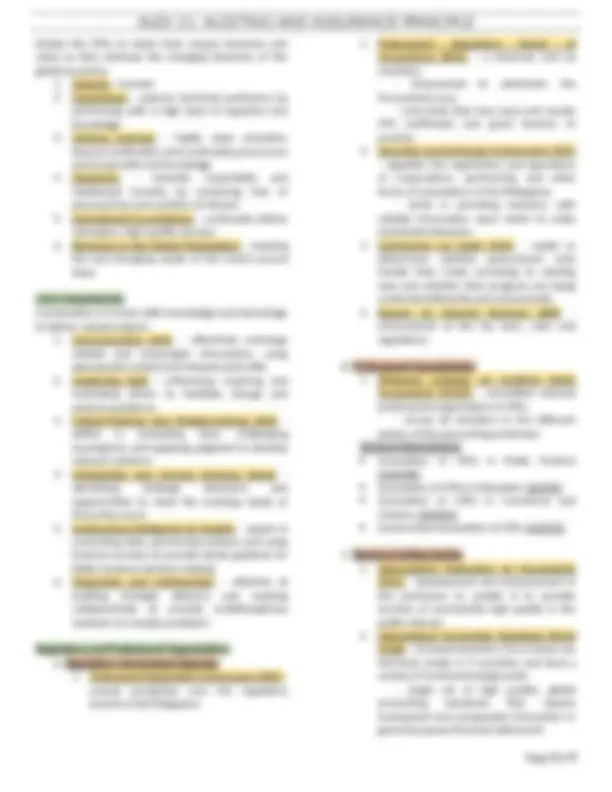
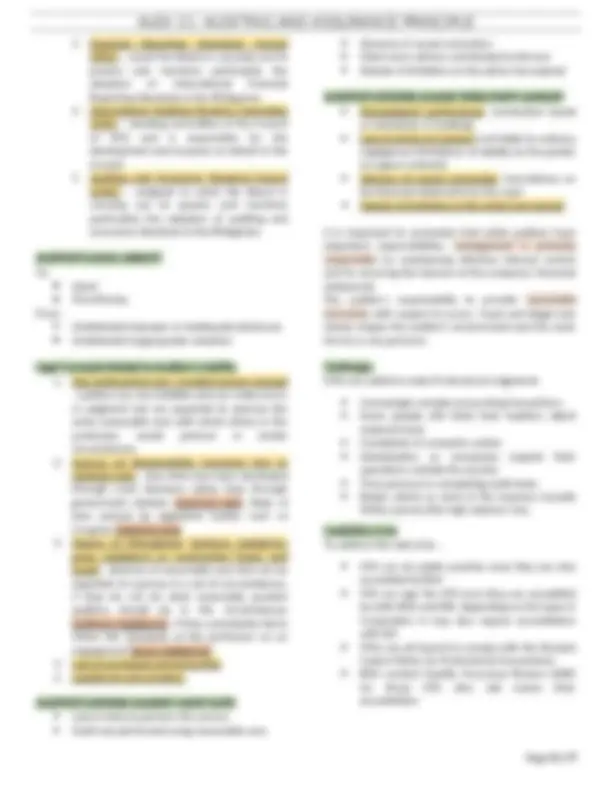
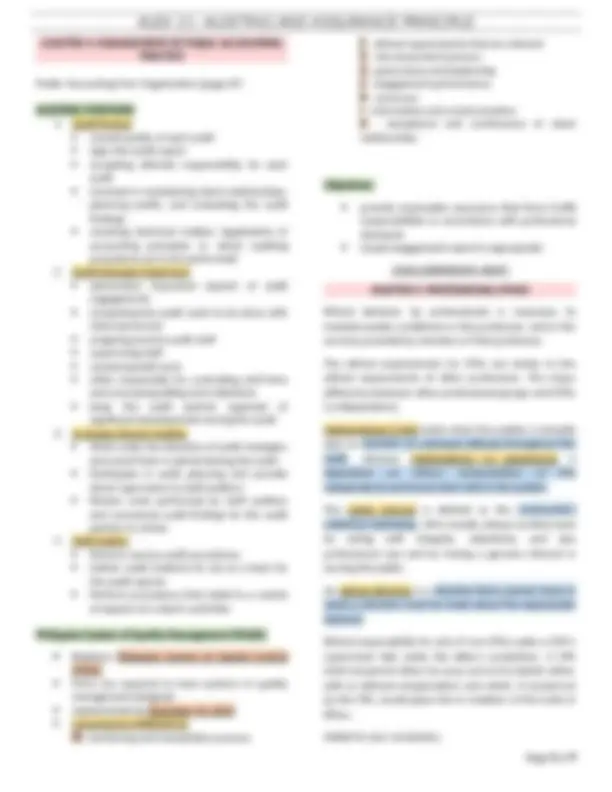
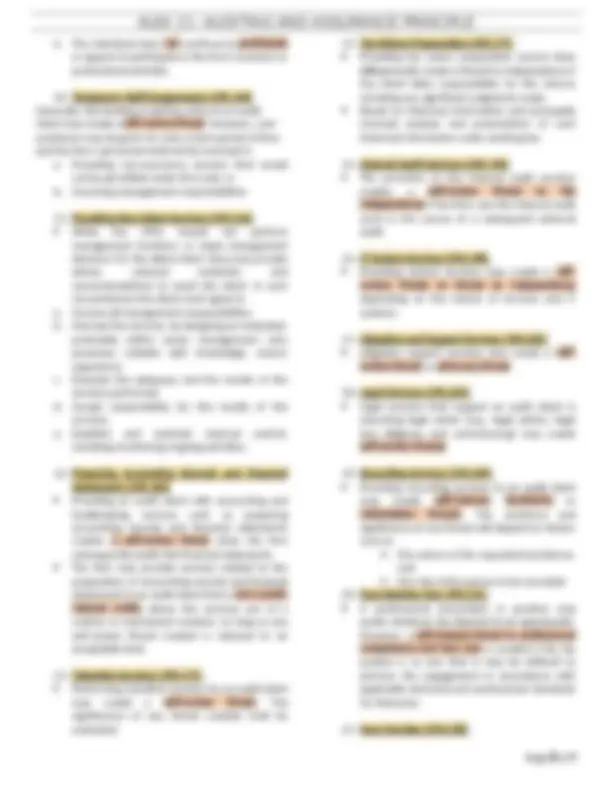
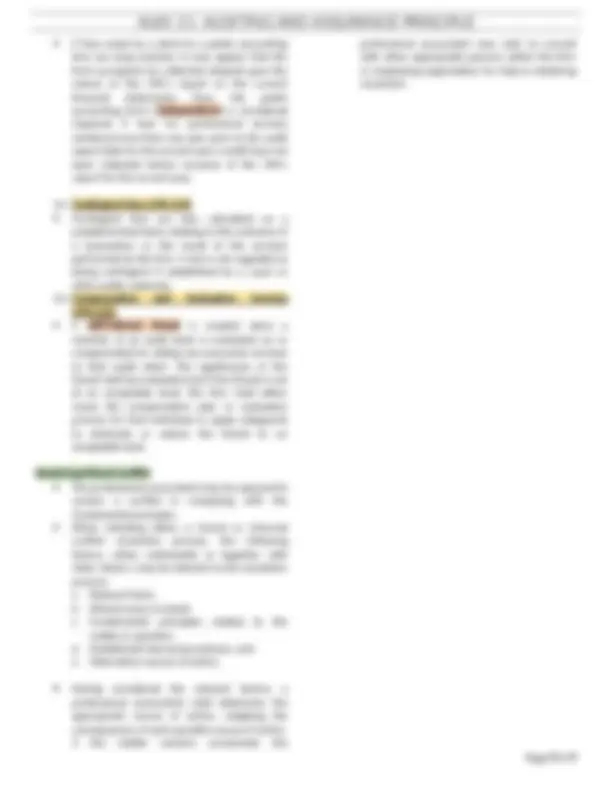


Study with the several resources on Docsity

Earn points by helping other students or get them with a premium plan


Prepare for your exams
Study with the several resources on Docsity

Earn points to download
Earn points by helping other students or get them with a premium plan
Community
Ask the community for help and clear up your study doubts
Discover the best universities in your country according to Docsity users
Free resources
Download our free guides on studying techniques, anxiety management strategies, and thesis advice from Docsity tutors
This document is a reviewer for Chapter 1-5 of auditing and assurance
Typology: Study notes
1 / 9

This page cannot be seen from the preview
Don't miss anything!







On special offer
Audit of FS Examination of Internal Control Trust Services Review of FS or Other Information Risk Advisory Services Others NON-ASSURANCE Tax Services Management Consultancy (fraud investigation and IT consultation) Compilation services Agreed-Upon Procedures Others Assurance
2. Forensic Auditors - Forensic Audits Hired by clients who perform investigations on fraud, crime embezzlement or reconstructing incomplete accounting records. (i.e. CrFA) 3. Government Auditors - Compliance and Operational Audits Independent government body who audit government offices/agencies (i.e. COA, BIR, SEC, BSP etc.) 4. Internal Auditors - Internal and Operational Audits - Hired by the client as a consultant to check FS, efficiency of operations and effectiveness of internal - Perform independent appraisal activity. - concerned with all kinds of financial and other data generated for both internal and external users. Types of other Audit Services 1. Internal Audit
Public Accounting Firm Organization (page 67) AUDITING POSITIONS
1. Audit Partner overall quality of each audit signs the audit report accepting ultimate responsibility for each audit involved in maintaining client relationships, planning audits, and evaluating the audit findings resolving technical matters (application of accounting principles or which auditing procedures are to be performed) 2. Audit Manager/Supervisor administers important aspects of audit engagements scheduling the audit work to be done with client personnel assigning work to audit staff supervising staff reviewing staff work often responsible for controlling staff time and overseeing billing and collections keep the audit partner apprised of significant developments during the audit 3. In-charge (Senior) Auditor Work under the direction of audit managers and assist them in administering the audit Participate in audit planning and provide direct supervision to staff auditors Review work performed by staff auditors and summarize audit findings for the audit partner to review 4. Staff Auditor Perform various audit procedures Gather audit evidence to use as a basis for the audit reports Perform procedures that relate to a variety of aspects of a client’s activities Philippine System of Quality Management (PSQM) Replaces Philippine System of Quality Control (PSQC) Firms are required to have systems of quality management designed implemented by December 15, 2022 Components (MERGER IA) : M - monitoring and remediation process E - ethical requirements that are relevant R - risk assessment process G - governance and leadership E - engagement performance R - resources I - information and communication A - acceptance and continuance of client relationships Objectives: provide reasonable assurance that firms Fulfill responsibilities in accordance with professional standards issued engagement report is appropriate (2022 ADDENDUM: NEXT) CHAPTER 5: PROFESSIONAL ETHICS Ethical behavior by professionals is necessary to maintain public confidence in the profession, and in the services provided by members of that profession. The ethical requirements for CPAs are similar to the ethical requirements of other professions. The major difference between other professional groups and CPAs is independence. Independence in fact exists when the auditor is actually able to maintain an unbiased attitude throughout the audit, whereas independence in appearance is dependent on others’ interpretation of this independence and hence their faith in the auditor. The public interest is defined as the community’s collective well-being. CPAs handle ethical conflicts best by acting with integrity, objectivity, and due professional care and by having a genuine interest in serving the public. An ethical dilemma is a situation that a person faces in which a decision must be made about the appropriate behavior. Ethical responsibility for acts of non-CPAs under a CPA’s supervision falls under the latter’s jurisdiction. A CPA shall not permit others to carry out on his behalf, either with or without compensation, acts which, if carried out by the CPA, would place him in violation of the Code of Ethics. Added to your vocabulary:
Where gifts or hospitality is made in the normal course of business without the specific intent to influence decision making or to obtain information, it may be conclude that any threat to compliance with fundamental principles is at an acceptable level. When the threats cannot be eliminated or reduced to an acceptable level through the application of safeguards, the professional accountant in public practice should not accept such offer. Accepting significant gifts may arise to self- interest threat to objectivity.
b. The individual does not continue to participate or appear to participate in the firm’s business or professional activities